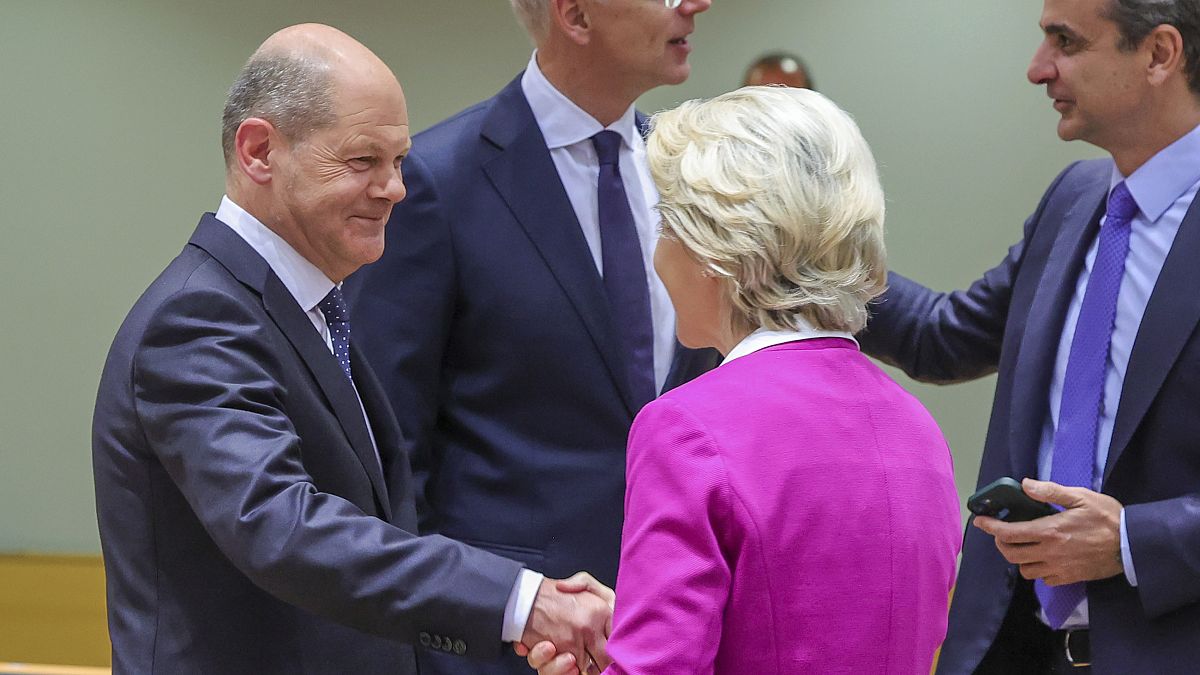The European Council agreed to a Hungarian demand to completely spare oil imports coming through pipelines.
After several hours of face-to-face wrangling, EU leaders have agreed to ban the vast majority of Russian oil from the bloc's market by the end of the year.
The embargo is set to target all seaborne imports – crude barrels and refined petroleum products – while excluding pipeline supplies.
The breakthrough was announced on Monday by Charles Michel, president of the European Council, shortly before midnight on the first day of an extraordinary summit in Brussels.
"We know that we needed a few weeks before we were able to take such a decision, but we sent a very strong signal today," said Michel.
"And I think that more than ever, it is important to show that we are able to be strong, we are able to be firm and we are able to be tough in order to defend our values and to defend our interests."
Sixth round of sanctions
The measure is part of the sixth package of EU sanctions in retaliation for Russia's invasion of Ukraine.
The latest raft also includes the expulsion of Sberbank, Russia's largest bank, from the SWIFT system and the blacklisting of individuals involved in alleged war crimes committed in Ukraine, as well as the head of the Russian Orthodox Church, Patriarch Kirill.
The original oil ban unveiled almost four weeks ago by Ursula von der Leyen, the president of the European Commission, targeted both seaborne and pipeline imports, with the phasing out planned by the end of the year.
But soon after von der Leyen's announcement, several member states, including Hungary, Slovakia, the Czech Republic and Bulgaria, raised concerns and asked for tailor-made exceptions in order to have more time to adapt their refineries and cushion the economic impact.
EU sanctions require the unanimous vote of all 27 member states.
Following several rounds of intense and unsuccessful negotiations, a last-minute compromise was reached to spare all oil imports coming through pipelines.
Ban on shipped oil
Around two thirds of Russian oil imported to the EU is shipped in via ports, with the rest coming directly through the Druzhba pipeline, a massive conduit that directly feeds refineries in Poland, Hungary, Slovakia, the Czech Republic and Germany. These refineries have for decades grown accustomed to the reliable and comparably cheap deliveries of a specific type of Russian oil.
Von der Leyen explained that, by the end of the year, over 90% of Russian oil will have been targeted, based on individual commitments made by Poland and Germany, who have pledged to ban their respective imports from Druzhba's Northern branch.
"This is an important step forward," said von der Leyen. "We will soon return to the issue of the remaining 10% of pipeline oil."
While the leaders committed to reopen to the pipeline issue "as soon as possible", no official deadline was provided, leaving the temporary exemption as indefinite in practice.
Hungary's big win
The pipeline derogation is seen as an important victory for Hungary's Prime Minister Viktor Orbán, who had pushed hard to win the concession, ruffling his fellow leaders along the way.
"Hungarian families can sleep peacefully tonight," said Orbán at the end of the meeting.
"Brussels' proposal would have been similar to an atomic bomb, but we managed to avoid it."
The Hungarian PM also negotiated a clause promising "emergency measures" in case of "sudden interruptions of supply," an assurance he demanded after a Ukrainian official warned "something could happen" to the Druzhba segment that runs through the country.
Orbán's hard-fought tweak also provides an important cover for countries dependent on oil from the Druzhba pipeline, with fears that the sudden switch to other providers would be costly and disruptive.
Exempting pipeline oil while banning seaborne imports is also likely to raise questions about unfair competition across the single market, since some member states will still be able to receive reliable and affordable supplies while others will struggle to secure more expensive crude barrels from non-Russian providers.
The summit's conclusions presents a vaguely-worded pledge to ensure fair competition and a "level playing field" among member states, with the Commission acting as monitor. However, the market implications remain to be seen and will not fully materialise until the embargo is completed.
Bold and consequential move
Despite the pipeline amendment and stalled talks, the step taken by EU leaders on Monday evening represents the boldest and most consequential in retaliation for Russia's invasion of Ukraine.
"Tonight, as Europeans, united and in solidarity with the Ukrainian people, we are taking new decisive sanctions," tweeted President Emmanuel Macron of France.
Fossil fuels are the Kremlin's most profitable source of revenue and provide a lifeline to sustain Russia's declining economy and bankroll its costly military campaign.
The EU is Russia's number one oil client. Pre-war figures indicate that the EU buys, on average, around 2.2 million barrels of crude, together with 1.2 million barrels of refined products, on a daily basis.
Since the onset of the conflict on 24 February, member states have spent about €30 billion on Russian oil, according to a tracking tool set up by the Centre for Research on Energy and Clean Air (CREA), an independent research organisation.
Given this high degree of energy dependence, the decision is expected to inflict pain on European households and companies, who have for months been struggling with soaring energy bills.
After Monday's political endorsement, ambassadors will meet to put the finishing touches on the agreement. The embargo will enter into force once the final version is published in the EU's official journal.
All eyes will then turn to other oil-producing countries, including Norway, the UK, the US, Libya, Nigeria, Kazakhstan, Iraq and Saudi Arabia, to fill the huge gap left by Russia.
The Organisation of Petroleum Exporting Countries (OPEC) has been limiting production since the start of the COVID-19 pandemic, claiming global demand is still unstable and under pressure from the virus.
